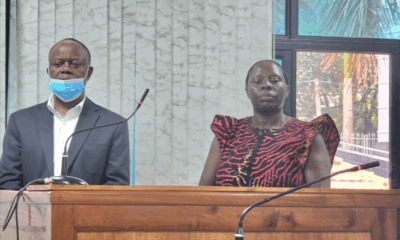News
Wage Bill Hits UGX 8.55 Trillion As Government Increase Salaries For CAOs, Senior Police Officers
The Ugandan government has significantly increased the national wage bill for the 2025/2026 financial year by UGX 724.7 billion, reaching a total of UGX 8.55 trillion. This substantial increment, effective July 1, 2025, is primarily aimed at enhancing salaries for a select group of public servants, including Chief Administrative Officers (CAOs), senior police and prison officers, and senior civil servants in local governments.
According to Circular Standing Instruction No. 01 of 2025 issued by the Ministry of Public Service, these enhancements are part of a phased government strategy to address long-standing wage disparities within the public service. “The government continues to fulfill its commitment to enhancing the salaries of all public officers in a phased manner. Accordingly, UGX 57 billion has been allocated for salary enhancement,” the circular stated.
The revised salary structure brings considerable increases for several key positions:
Chief Administrative Officers (CAOs) and Equivalents: CAOs will now earn UGX 12.75 million monthly, a more than fivefold increase from their previous UGX 2.37 million. This new bracket also includes Town Clerks of City Councils, Deputy Directors, Commissioners, Undersecretaries, and Foreign Service Officers (Grade I), who previously earned between UGX 1.86 million and UGX 2.08 million.
Senior Police and Prison Officers: Assistant Inspectors General of Police (AIGPs) and their prisons counterparts will see their salaries rise from UGX 7-8.8 million to UGX 12.75 million. Senior Commissioners and Commissioners have also been elevated to this bracket. Assistant Commissioners’ salaries jump from UGX 1.6 million to UGX 3.8 million, while Superintendents will now earn UGX 2.05 million, up from UGX 990,000.
Lower Ranks in Security Forces: Police Constables will receive a more modest increase from UGX 466,000 to UGX 583,000, and Special Constables from UGX 375,000 to UGX 469,000.
Minister of Public Service, Muruli Mukasa, explained that these enhancements are part of a broader strategy launched in the 2018/2019 financial year, which has already seen an investment of UGX 2.4 trillion in salary improvements, particularly in critical sectors.
“We are now entering the second phase, focusing on covering all remaining staff. With this progression, we are on track to meet 77% of our medium-term salary targets,” Minister Mukasa affirmed. He added that the expanded wage bill will also accommodate new staff recruited in the education and health sectors, notably under the Uganda Intergovernmental Fiscal Transfers (UGIFT) programme, as well as personnel at newly constructed schools, health centres, and newly appointed departmental heads at the local government level.
This announcement comes amidst ongoing public discourse regarding wage disparities, especially among non-science civil servants. Secondary school arts teachers, who recently staged a strike demanding salary parity with their science counterparts, were assured by the Ministry of Finance that a 25% salary increment would be implemented for their group in the next financial year, despite the current budget constraints making a full raise to UGX 4 million per month unaffordable (estimated at over UGX 500 billion annually).
President Yoweri Museveni has consistently defended the prioritisation of scientists in pay enhancements, citing their strategic role in national development, while assuring that other civil servants will also benefit as government revenues grow.
With the new adjustments, Uganda’s national wage bill has increased from UGX 7.82 trillion in FY 2024/2025 to UGX 8.55 trillion for FY 2025/2026. This now accounts for approximately 11.8% of the national budget, which is currently estimated at UGX 72.4 trillion. Of the total wage bill, 58.9% is allocated to central government civil servants and public leaders, 48% supports personnel at the local government level, and the remainder covers staff at foreign missions.
The government’s continued commitment to phased salary enhancements signals a concerted effort to improve the welfare and motivation of its public service, aiming for improved service delivery across all sectors.
Comments

























